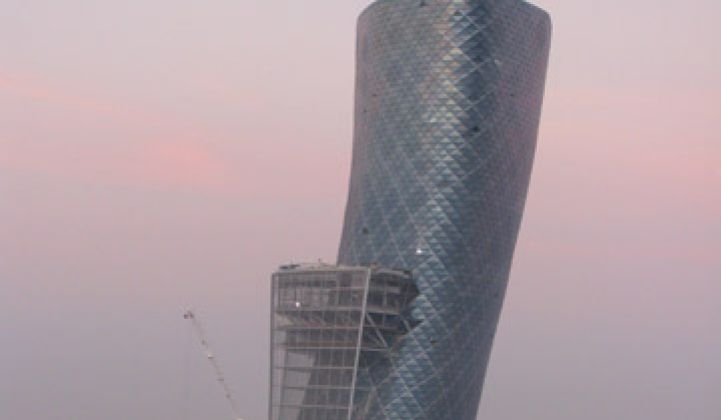The Abu Dhabi Water and Electric Authority today said it would adopt energy management services from Hara that could dramatically slash its energy consumption.
Hara's services -- which examine energy consumption and provide recommendations and pathways for reducing it -- could save Abu Dhabi, the most powerful emirate in the United Arab Emirates, three billion dollars over the next ten years. Money, though, is beside the point. The emirate's small population and massive oil reserves have made Abu Dhabi one of the wealthiest spots on the planet.
The big gains come in reducing energy consumption. Like Qatar and other Middle Eastern nations, the United Arab Emirates has a high rate of power consumption per capita. Air conditioners hum on high during many months of the year and the lights on the skyscrapers blaze throughout the night. Hara and the Electric Authority estimate that the software could save 12 terawatt hours, or twelve trillion watt hours, a year by 2020 and defer the construction of several natural gas power plants. This video, taken earlier this year in Abu Dhabi, shows the nutty pace of construction that is the norm in the region. (The picture shows one of the many skyscrapers under construction.)
Expect Abu Dhabi to "encourage" Hara to open a development office there, too. The emirate, through its Masdar Initiative, wants to turn itself into a hub for alternative energy research, development and manufacturing. It has created an energy graduate school, the Masdar Institute, with cooperation from MIT. To recruit students from around the globe, it pays their tuition and living expenses.
As part of this effort, Abu Dhabi encourages multinationals to open branches in Masdar City. The country has also created its own companies, like Masdar PV, to employ graduates of the Institute, and it has its own VC arm. Most of the students and employees at the Masdar companies are foreigners. The most common accent around Masdar City, the zero-energy center built on the outskirts of the emirate, is English. Still, over time, Abu Dhabi hopes to have a larger number of its own citizens working in key positions in these companies and institutes.
But here's the catch: sometimes the faces and participants change rapidly. In the past year, both the CEO of Masdar PV and the provost at the Masdar Institute have stepped down. Thus, Hara might be in there now, but don't be surprised if the company -- or any other multinational -- moves along after a few years. Funding for Masdar efforts will also fluctuate with oil prices.
Other Hara customers include Safeway, the city of Philadelphia and News Corp. It only emerged from stealth about 18 months ago. We believe it is one of the prime acquisition targets in green tech.
Meanwhile, SunPower said it will erect a 1-megawatt power plant on the roof of the Masdar Institute. SunPower won't be alone. Right across the street, the Masdar Initiative has created a 10-megawatt solar field with panels from Suntech and First Solar. A little farther away sits an experimental solar thermal turbine under development by the Masdar Institute; this video shows the prototype in action.



